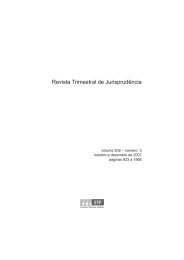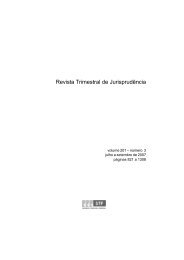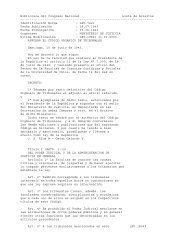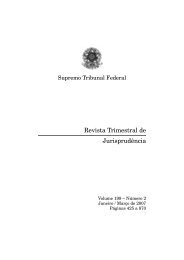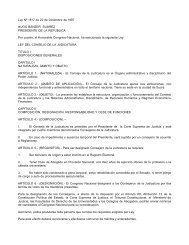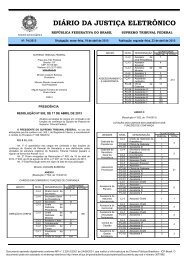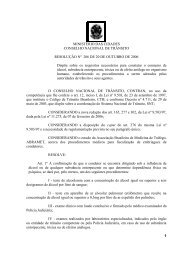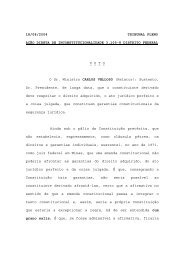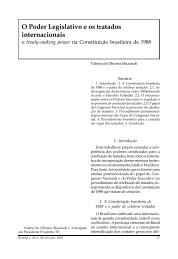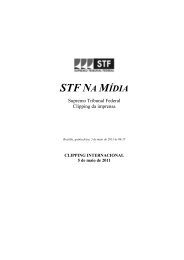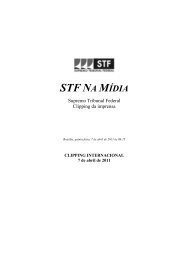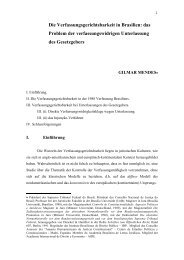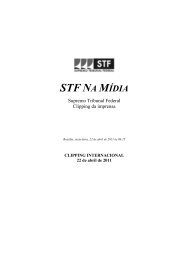STF NA MÍDIA
STF NA MÍDIA
STF NA MÍDIA
Create successful ePaper yourself
Turn your PDF publications into a flip-book with our unique Google optimized e-Paper software.
which is owned by the state.<br />
Ghassan Ibrahim, CEO of the<br />
Global Arab Network and a<br />
prominent opponent of the<br />
regime, tells me that the government<br />
permits foreign<br />
companies a share of its booty<br />
only if they can offer<br />
expertise it does not otherwise<br />
possess. As much of the<br />
wealth produced by Syrian<br />
state companies goes into the<br />
pockets of the elite, it seems<br />
clear that if Shell were not<br />
useful to the regime, it would<br />
no longer be there.<br />
Shell says: "We condemn<br />
any violence and the human<br />
rights abuse it represents and<br />
we have deep concern over<br />
the loss of life … we comply<br />
with all applicable international<br />
sanctions." But, though<br />
complying with current sanctions,<br />
it is enriching a government<br />
that is violently<br />
repressing peaceful protest.<br />
The regime has killed some<br />
2,600 Syrian people since<br />
March. Its interrogators have<br />
tortured and mutilated its<br />
prisoners, cutting off genitals<br />
and gouging out eyes.<br />
The likely outcome of Shell s<br />
investment is that Assad has<br />
more money to spend on<br />
soldiers, weapons and prison<br />
cells. The argument for forcing<br />
Shell and other investors<br />
to leave and for finding further<br />
means of starving the<br />
government of money is a<br />
strong one.<br />
But no one with an interest in<br />
human rights can be unaware<br />
of what happened when<br />
western nations applied sanctions<br />
to Syria s neighbour,<br />
Iraq. No one who has seen it<br />
can forget the CBS interview<br />
in 1996 with Madeleine Albright,<br />
Bill Clinton s secretary<br />
of state. The interviewer<br />
pointed out that half a million<br />
children had died in Iraq<br />
as a result of sanctions. "We<br />
think the price is worth it,"<br />
Albright replied. The sanctions<br />
on Iraq could scarcely<br />
have been better designed to<br />
cause mass mortality. But<br />
even measures that are narrower<br />
in scope and applied<br />
more humanely will add economic<br />
distress to the suffering<br />
of Syria s people. Sanctions<br />
broad enough to hurt<br />
the government s ability to<br />
deploy troops will also be<br />
broad enough to hurt the people<br />
they are meant to protect.<br />
And if not sanctions, then<br />
what? So far the only alternatives<br />
on offer are vacuous<br />
condemnation and demands<br />
from the likes of Nick Clegg<br />
that "it s time for Assad to<br />
go", which, in terms of efficacy,<br />
is like being mauled by<br />
a giant sock.<br />
So far the European Union<br />
has imposed travel bans on<br />
members of the regime and<br />
frozen some of their assets.<br />
The impact is likely to be<br />
limited, not least because<br />
Assad and his close associates<br />
are said to have stashed<br />
far greater sums beyond the<br />
reach of the EU (and beyond<br />
the reach of any kind of scrutiny<br />
or accountability) in<br />
Swiss banks. It wasn t until<br />
May that European governments<br />
decided to impose an<br />
arms embargo on Syria, which<br />
tells us more than is comfortable<br />
about their priorities.<br />
But better late than never.<br />
More recently, Europe banned<br />
the import of Syrian oil.<br />
Because the EU imported<br />
over 90% of Syria s oil, because<br />
oil provides 25% of<br />
state revenue and because the<br />
state has a monopoly on its<br />
sale, this would have stung –<br />
had Italy not insisted that the<br />
ban be delayed until mid-<br />
November. This gives the<br />
government time to find new<br />
customers. An investment<br />
ban, which would reduce the<br />
value of assets that enrich the<br />
political elite, could hit the<br />
government much harder.<br />
The obvious means of resolving<br />
this question is to ask<br />
the Syrian people what they<br />
want. But there is no clear<br />
consensus. Of the three opponents<br />
of the Assad regime<br />
I ve consulted, two are in<br />
favour of wide-ranging sanctions,<br />
one is against. Chris<br />
Doyle, director of the Council<br />
for Arab-British Understanding,<br />
who has spoken to a<br />
much larger number of dissidents,<br />
tells me that "Syrians<br />
are hugely divided on this<br />
issue". Almost everyone in<br />
the protest movement supports<br />
sanctions aimed specifically<br />
at members of the<br />
regime and their businesses,<br />
but they are split over wider<br />
measures, such as the EU s<br />
oil embargo.<br />
Ghassan Ibrahim told me that<br />
opponents of the government<br />
recognise that "freedom is<br />
very expensive and you have<br />
to pay the price. Let s pay it<br />
once and for good." He argues<br />
that sanctions are likely<br />
S T F N A M Í D I A • 2 2 d e s e t e m b r o d e 2 0 1 1 . . . . . . . . . . . . . . . . . . . P Á G I N A 2 0 6



